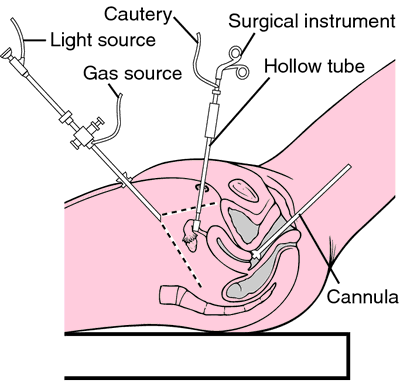
En-doe-mee-tree-what? This medical condition’s weird sounding name just barely scratches the surface of the somewhat medical mystery. Due to limited research and women being told to keep quiet and not complain or being shamed for their pain by medical professionals and others, the symptoms of this condition often go untreated.
Endometriosis, derived from “endometrium” (the tissue that lines the uterus), is a medical condition where those with a uterus have endometrial-like tissue outside of their uterus. Let’s quickly break down what is supposed to happen during a menstrual cycle in order to explain what happens when someone has endometriosis:
During a regular cycle, the endometrial tissue builds up (as the body prepares a comfortable home for a potential inhabitant) and then sheds if the egg isn't fertilized, etc. etc. In a body affected by endometriosis, cells mimic endometrial tissue develops outside of the uterus but responds as if it is that tissue. This means hormonal changes such as breaking down the endometrium also cause this copycat tissue to break down, which leads to a bleeding pelvis, which leads to inflammation, swelling, and scarring of normal tissue surrounding the copycat stuff. This copycat stuff can grow on other organs as well, which means a lot of pain in a lot of places below the belt.
Johns Hopkins University calls endometriosis “a common gynecological condition.” According to the Endometriosis Foundation America, an estimated 7 to 10 million women in the U.S. alone have endometriosis -- to put it into perspective, that is three times the population of Chicago. They estimate that 200 million women worldwide struggle with this condition.1
When first reading up on endometriosis, I was astounded. How could this many people with a uterus struggle with something so painful and how could I not even know about it? I knew a lot about STI’s and erectile dysfunction, yet I had never heard of endometriosis (which is a popular contributor to painful sex, infertility, and all-around constant discomfort).
So, what are the facts? Who can endometriosis affect, what are the most common symptoms, and is there a cure?
Who Can Endometriosis Affect?
Endometriosis can affect anyone with a period. This means any age; as long as someone with a uterus is at the reproductive age, they can be affected by endometriosis. Some studies show a genetic tie with endometriosis, showing that if you are related to someone who has it, you are 5 to 7 times more likely to struggle with it yourself.
Other studies link endometriosis to the immune system and the body’s inflammatory response. 2
Others find links between endometriosis and sexual trauma and childhood abuse. Epidemiologist Dr. Holly Harris of Fred Hutchinson Cancer Research Center, lead author of a study linking the two, said “Both physical and sexual abuse were associated with endometriosis risk, and it’s a strong association. There’s also a dose-response, meaning the risk increases with increasing severity and type of abuse.”
The study found that women who reported “severe to chronic abuse” had a 79 percent higher risk of developing endometriosis. 2
What Are the Most Common Symptoms?
I once watched a video of a woman trying to simply get ready for work and school in the morning. It took her significantly longer than the average person to complete a simple routine of brushing hair, teeth, maybe applying some mascara, because she was wincing between tasks or needing to hold herself in the fetal position and focus on breathing through the pain so often. This wasn’t a typical PMS experience -- the woman said she dealt with this pain frequently, not just around the time of her period.
The stomach pain is so severe that it interrupts much of regular life. From walking to socializing, to eating. Other symptoms of endometriosis include:2
-Intense cramping of the uterus (not just during PMS or period)
-Long periods
-Heavy menstrual flow
-Bowel and urinary disorders
-Nausea and/or vomiting
-Pain during sexual activity
-Infertility
-Chronic fatigue
As someone who has experienced symptoms of endometriosis (without an official diagnosis; just suspicion from medical professionals), I can say that this condition drastically affects day to day activity and can take a drastic toll on relationships.
How is Endometriosis Diagnosed and Is There a Cure?
It starts with a conservative approach; treating symptoms (versus the cause) in order to avoid invasive surgery to see if there is that tissue we discussed previously hanging outside of the uterus.
One of the ways medical professionals recommend treating the symptoms is through hormone birth control. This doesn’t cure the condition, but it can help alleviate some of its side effects. The Endo Foundation also notes changing your diet or acupuncture. There is a myth that getting pregnant cures endometriosis; however, what really happens is that there can be relief from endometriosis during pregnancy because of increased progesterone in the body. 2
Additionally, having endometriosis does not mean you will definitely have infertility issues. Up to 30 to 50 percent of women with endometriosis may experience infertility.3
A mystery surrounding endometriosis is that while it can recede during menopause and pregnancy, for some women it just goes away without explanation. 4
The biggest issue with endometriosis and treatments, cures or even symptoms is that almost all of the research says more research needs to be done in order to better understand the condition. If you are interested in donating to endometriosis research, check out some of the following endometriosis foundations:
Endometriosis Foundation America
1. Endometriosis Foundation of America, Endometriosis A-Z, https://www.endofound.org/endometriosis-a-to-z
2. Endometriosis Foundation of America, What is Endometriosis?, https://www.endofound.org/endometriosis
3. Reproductive Facts, Endometriosis: Does it cause infertility? https://www.reproductivefacts.org/news-and-publications/patient-fact-sheets-and-booklets/documents/fact-sheets-and-info-booklets/endometriosis-does-it-cause-infertility/
4. WebMD, A Visual Guide to Endometriosis, https://www.webmd.com/women/endometriosis/ss/slideshow-endometriosis-overview




Add a CommentComments
There are no comments yet. Be the first one and get the conversation started!